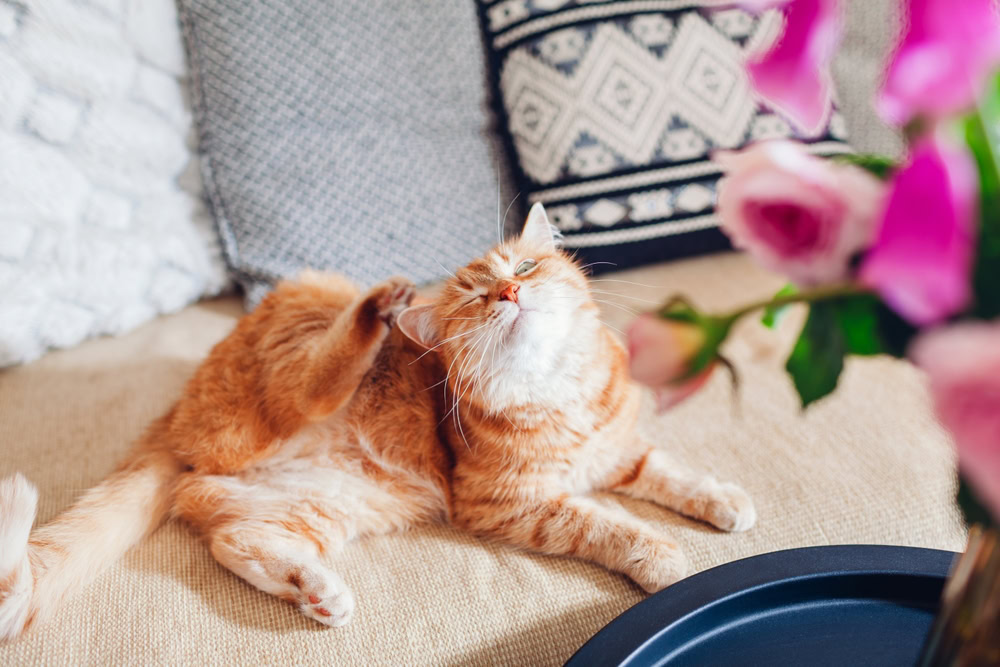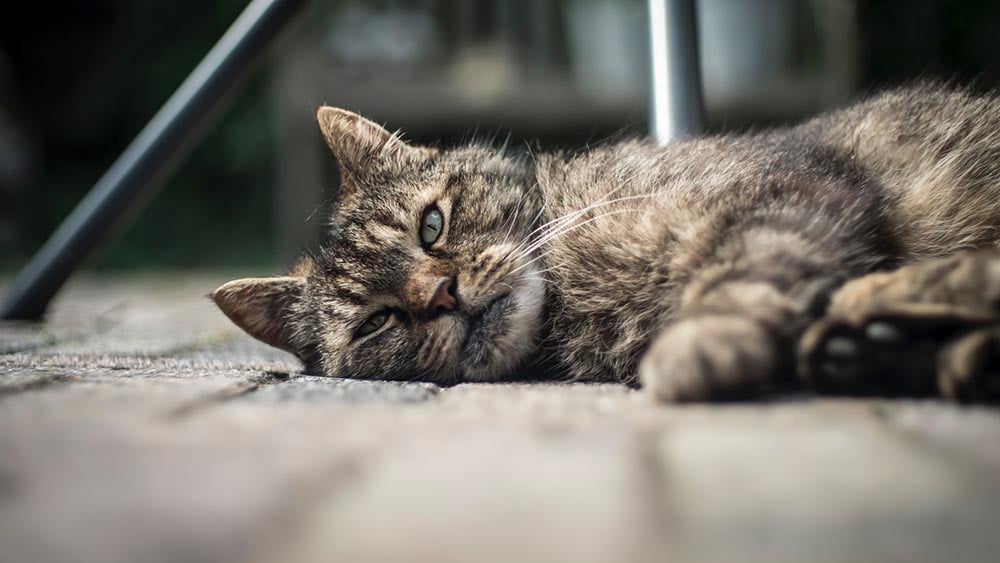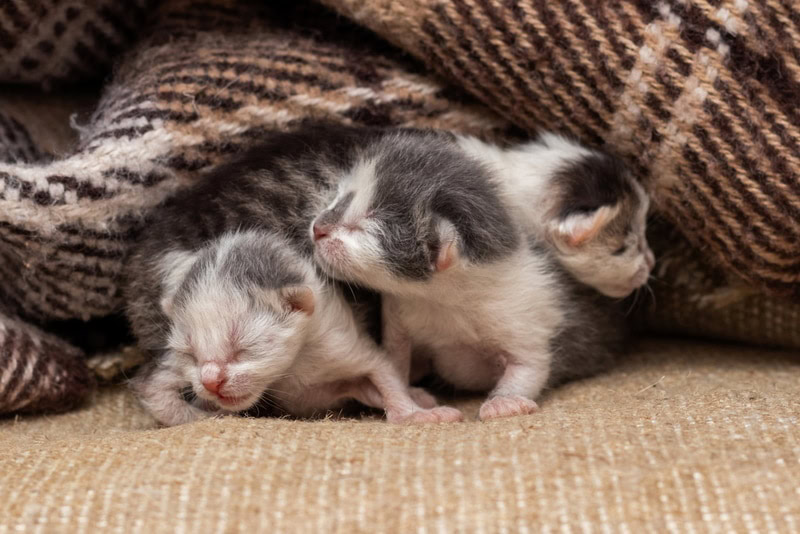Cats engage in many strange activities, but one of the stranger ones is shaking their heads around. But why do they do this? Keep reading as we list several possible reasons and answer a few related questions to help you be better informed.
Disclaimer: Please note that if your cat is shaking their head excessively, every single day, or it started very suddenly, or is accompanied by an ear wound, discharge, swelling, unpleasant smell or a head tilt, they should get checked out by your veterinarian promptly.

The 11 Vet-Reviewed Reasons Why Cats Shake Their Heads
Disclaimer: This list encompasses the most common reasons why cats may be shaking their head but is not exhaustive.
1. Grooming
Cats are known for their cleanliness, and very occasional and infrequent shaking of their heads can be a natural part of their grooming routine. Cats use their paws to clean their faces and ears during grooming sessions, and shaking their heads may help them dislodge any dirt, debris, or excess moisture that may have accumulated in their fur. However, shaking their head in this instance should be rare and unnoticeable, while more often shaking the head indicates an irritation and discomfort within the ear canal that will require veterinary attention.
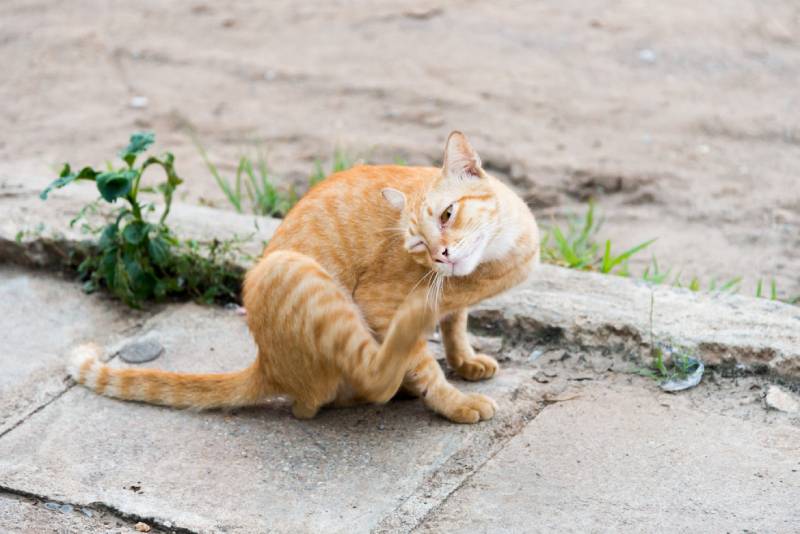
2. Ear Infection
Ear infections, whether bacteria or yeast-related, can cause significant discomfort for cats. Along with head shaking, you may observe scratching, redness, swelling, discharge, or a foul odor emanating from the ears. If you notice any of these signs, contact your vet immediately to get the proper treatment.
3. External Parasites
Ear mites are common parasites that can infest a cat’s ears. They cause intense itching and irritation, prompting cats to shake their heads forcefully to alleviate the discomfort caused by these tiny pests. It’s a common reason that a cat might shake their head for seemingly no reason, and you might be able to see the mites rapidly moving, but just barely.
Infestation with fleas can also cause itchiness all over the body, particularly around the lower back, tail base, belly, and head, which can involve the ears, and cause scratching and head shaking. Fleas are visible by the naked eye, as well as small black dirt or coffee ground-looking material which is their feces left after feeding on the animal’s blood (often referred to as flea dirt). Both of these infestations need prompt treatment from the vet.
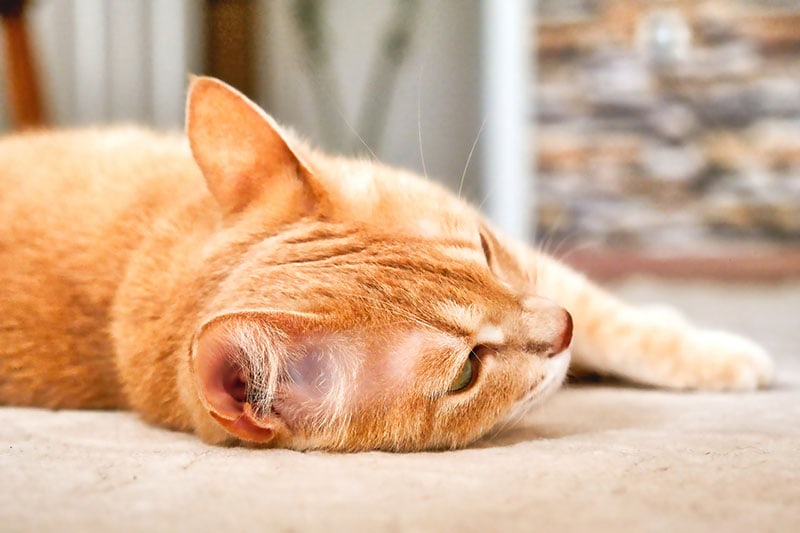
4. Foreign Objects
If a foreign object like a grass seed or another small particle becomes lodged in a cat’s ear, it can cause significant discomfort and irritation. The cat may shake their head vigorously to dislodge the object and alleviate the pain. If this behavior persists indicating either that the object remains stuck or that the ear is severely inflamed and painful, you’ll need to take your cat to the vet to have their ears checked.
5. Ear Injury
Trauma or injury to the ear, such as from a fight or accident, can lead to pain and irritation. Sometimes an abscess or a pus-filled pocket may also form. Cats may shake their heads as a reflexive response to the discomfort caused by the injury, and this is accompanied by the presence of a wound, discharge, swelling, or bad smell.
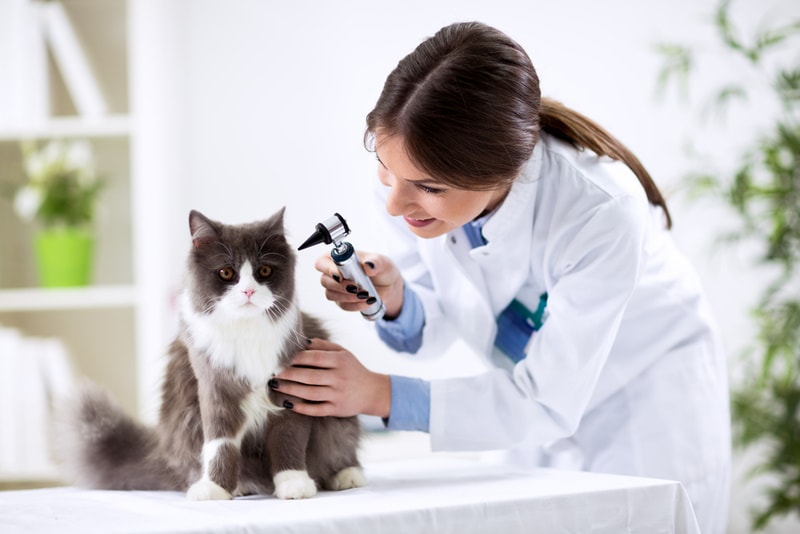
6. Water in the Ears
Many cats dislike water, and getting their ears wet during grooming or bathing, or after being outside when it rained, can be particularly bothersome. Head shaking is how they remove water from the ears and restore comfort.
7. Allergies
Like humans, cats can develop allergies to certain food proteins, and environmental factors such as grasses, weeds, pollen, house dust mites, fleas, or other substances that they encounter. Allergic reactions often manifest as itching or irritation in various body parts, including the ears, leading to excessive scratching, overgrooming, and licking. Cats may shake their heads vigorously to relieve the itching sensation. If you think that allergies are affecting your cat, contact the vet who can discuss the diagnostic process when suspecting allergies and potential food trials.
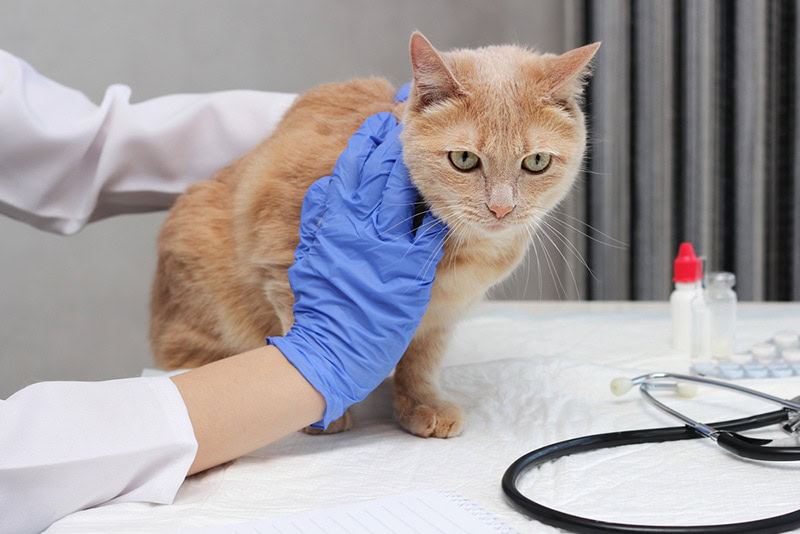
8. Ear Canal Polyps
Ear canal polyps are abnormal growths in a cat’s ear canal, usually developing inside the middle ear. These can get bigger and expand towards the external ear canal or the back of the throat, causing various signs such as discomfort, itching and pain, snorting sounds, nasal discharge, sneezing, head tilt, and others. In response, cats may also vigorously shake their heads to mitigate the unpleasant sensations caused by these benign growths. They can’t be easily visualized and your vet will speak to you about performing x-rays or CT scans in order to identify the polyp. Besides these non-cancerous growths, there could be other masses in the ear canal leading to the same presentation.
9. Ear Injury
Trauma or injury to the ear, such as from a fight or accident, can lead to pain and irritation. Cats may shake their heads as a reflexive response to the discomfort caused by the injury.
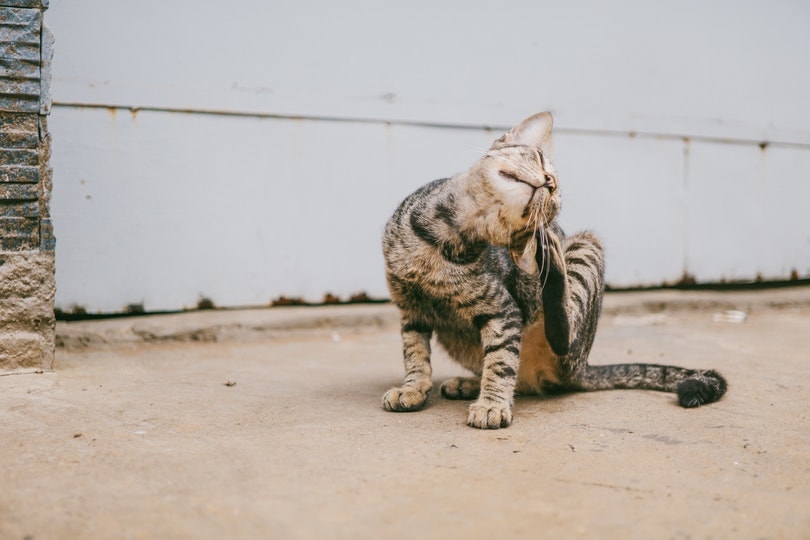
10. Aural Hematoma
Aural hematoma is a blood-filled pocket that forms on the ear pinnae, often due to chronic and frequent head shaking and scratching, commonly associated with severe ear infections. It’s a soft and often warm swelling that feels fluid-filled, but it can cause the ear to become wrinkled if not treated in time.
11. Neurological Disorders
Certain neurological conditions can cause facial twitching and sometimes involuntary head shaking in cats. Seizures or tremors may manifest as rhythmic or uncontrolled shaking movements. These conditions require medical attention and management.

Frequently Asked Questions
Is It Normal for Cats to Shake Their Heads?
Yes, it can be normal for cats to occasionally shake their heads but this is generally quite rare in healthy cats. However, excessive or persistent head shaking often indicates an underlying health issue.
How Can I Tell If My Cat’s Head Shaking Is a Problem?
Pay attention to the frequency and intensity of the head shaking. If your cat shakes their head excessively or forcefully, it happens every day or the head shaking is accompanied by other signs of discomfort or distress, it may indicate a medical problem. Other signs to watch for include redness, swelling, discharge, odor, head tilt, or changes in behavior.
Are There Any Home Remedies for Cat Head Shaking?
Before you attempt home remedies, it’s important to identify the underlying cause of the head shaking with the help of a vet. Some causes, such as ear mites or infections, may require specific treatments prescribed by a veterinarian. It’s best to consult a vet for appropriate advice and guidance tailored to your cat’s condition.

Final Thoughts
A cat might shake their head for many reasons, and the list above is not exhaustive. Some of the most common causes are ear infections, infestation with fleas or ear mites, allergies, foreign objects, polyps, dental pain, and more. It’s important to check your cat’s ears regularly and visit the vet if the shaking is frequent, a daily occurrence, and violent.
- https://www.petmd.com/
- https://vcahospitals.com/
- https://www.vet.cornell.edu/departments-centers-and-institutes/cornell-feline-health-center/health-information/feline-health-topics/ear-mites-tiny-critters-can-pose-major-threat
- https://vcahospitals.com/know-your-pet/nasopharyngeal-polyps-in-cats
- https://www.pdsa.org.uk/pet-help-and-advice/pet-health-hub/symptoms/head-shaking-in-cats
- https://vcahospitals.com/know-your-pet/nasopharyngeal-polyps-in-cats
Featured Image Credit: Mariia Boiko, Shutterstock
Contents
- The 11 Vet-Reviewed Reasons Why Cats Shake Their Heads
- 1. Grooming
- 2. Ear Infection
- 3. External Parasites
- 4. Foreign Objects
- 5. Ear Injury
- 6. Water in the Ears
- 7. Allergies
- 8. Ear Canal Polyps
- 9. Ear Injury
- 10. Aural Hematoma
- 11. Neurological Disorders
- Frequently Asked Questions
- Is It Normal for Cats to Shake Their Heads?
- How Can I Tell If My Cat’s Head Shaking Is a Problem?
- Are There Any Home Remedies for Cat Head Shaking?
- Final Thoughts
